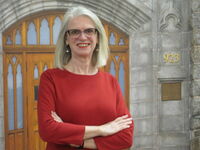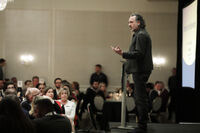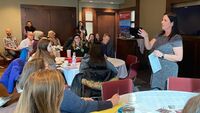By Philip Moscovitch |
It may not be the hockey championship JP MacCallum dreamed of winning as a kid on Prince Edward Island, but it’s still awfully sweet.
MacCallum BSc’99 led the Tohoku Free Blades to the Asia League title this past season—the team’s second championship in his three-year tenure as Head Coach. The Free Blades play in the city of Hachinohe, at the northern tip of Honshu, Japan’s main island.
The team’s success “kind of rocked the Japanese hockey world, because traditionally the hockey powers have been from the northern island of Hokkaido,” MacCallum says. One title was surprising. Two in three years was shocking.
MacCallum got his start in coaching at Saint Mary’s. After growing up on PEI, he moved to the US, attending high school in Connecticut and then spending his first year of university playing for Union College in upstate New York. But the school was not a great fit, and after his freshman year, he decided to move on. Saint Mary’s—and Halifax—seemed to present a better opportunity. “I wasn’t going to be given much opportunity to play at Union after my freshman year, and a friend of mine—Marcel Pineau, another Island boy—was playing in the US too and it wasn’t going the way he wanted either,” he says. “So we both decided to go to SMU.”
MacCallum played two years for the University in the late ’90s, then focused on his studies (a Major in Biology with a Minor in English) for his final year. But he also became interested in innovative approaches to training—especially strength training—that were slow in coming to the hockey world.
“I got into training on my own. I’d been working out with my father since I was 15, and I tried to absorb as much knowledge from as many sources as I could,” he says. “There was not a lot of great knowledge out there for sports at the time—it was all about being a bodybuilder and getting big. But through the 2000s there were a lot of advances in the field, and I followed them.
“My teammates at Saint Mary’s started to know that I was doing that and began training with me informally in the off-season. I started training full-time in the summer of 2000 and went with it.”
Huskies Hockey Head Coach, Trevor Stienburg hired MacCallum as an Assistant Coach in 2004—and he’s still gushing about him. “I love JP!” he says. What impresses him most is MacCallum’s combination of knowledge and soft skills. “The fabric of everything he does is pure work ethic and sacrifice. So you mix that with the fact that he’s very knowledgeable about the game and strength training, and that’s the clicker. There are a lot of guys who know about strength and conditioning but don’t know anything about hockey. Not only does he know the game and how the body works, he’s also lived it as a player,” Stienburg says. “I burn hot. I’m kind of an in-your-face guy and he has the ability to be very calm. He was sometimes able to wrap up my message much sweeter than I could.”
Meanwhile, word of MacCallum’s abilities as a trainer had been getting out among local NHL hopefuls. He rented space in the basement of a Halifax gym and started training elite prospects—something he continues to do even as those prospects have blossomed.
“I’ve been fortunate to work with some great players who love coming back every summer and being pushed. Brad Marchand and Andrew Bodnarchuk are on their 14th summer of training with me. I started with them when they were 13-year-olds,” MacCallum says. Marchand, of course, has a Stanley Cup ring with the Boston Bruins, and former Mooseheads star Bodnarchuk just signed a deal with the Columbus Blue Jackets. Another MacCallum protege, Alex Grant, was just signed by the Arizona Coyotes.
After leaving SMU, MacCallum landed as a head coach in the Hungarian league, and then as part of the coaching squad for the Hungarian national team in the 2012 Division I World Hockey Championships in Slovenia. That’s where he first met Chris Wakabayashi, the Canadian-born Free Blades General Manager.
MacCallum says the Free Blades “were interested in me the most because of what I bring on and off the ice. Chris knew that what Japanese hockey really needs is training year-round and getting stronger in the off-season. A lot of the teams were doing great endurance training, but the strength was not where it needed to be.”
He adds, “I knew the level of hockey in Japan was going to be good, but I was surprised by the depth of the teams. The abilities of the guys on all four lines are very good. They could skate circles around most North American players—but where they need the most help is strength on the stick.”
MacCallum and his wife, Mara Panacci, also pitched themselves as a package deal (she teaches yoga and offers nutritional counselling). But getting the players to buy in was not easy—at first.
“The hockey players in Japan had never done yoga before. They were skeptical,” Panacci says. “It was also the first time they had experienced off-ice training the way JP does it—in the gym, with an ethic of working hard. But in that first year, they saw the results: they won the championship, they felt better, and they weren’t getting hurt as often.”
While we may not think of Japan as a hockey power, MacCallum says the quality of play is high and that interest shot up after the Women’s National Team made the Sochi Olympics. The Asia League has nine teams, including four in Japan, three in South Korea, and one each in China and Russia.
And while Japanese players may be on the small side, MacCallum says the hockey world is learning to see
beyond size. “Bulk alone doesn’t work in the game. No matter how big you are, you need to be fast. The game is faster all the time.”
This year, MacCallum plans to spend the coming year focusing on his performance training business and travelling through Central and South America with Panacci and their two daughters. He doesn’t know what will come next. “I see the exact same will and desire to win in every spot I’ve been,” he says, “and it’s fun to be a part of that.”
As for Stienburg, he thinks his former assistant has what it takes to make it in hockey’s biggest arena. “I wouldn’t be shocked if all of a sudden he ended up as a professional coach here in North America,” he says. “All he needs is a chance here—I hope that in a few years I’ll be watching him on TV.”




